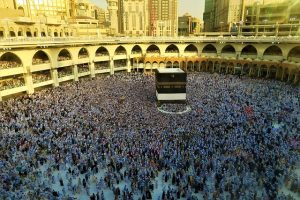Saudi Arabia’s Tourism Industry Drawing Massive Crowds of International Non-Religious Tourists
 International travellers looking for new adventures and historical explorations more than welcomed Saudi Arabia’s decision to allow non-religious tourism. Unlike before when only Muslims were at the heart of the country’s tourism industry. As it is, the annual Hajj pilgrimages to Mecca and other holy cities are obligations that must be fulfilled by financially and physically capable Muslims. On the other hand, non-Muslims or tourists who have no other business but to visit and sightsee were excluded. Up until 2019 when the Saudi government opened the country’s doors to international tourism as part of its Vision 2030 social and economic reform program.
International travellers looking for new adventures and historical explorations more than welcomed Saudi Arabia’s decision to allow non-religious tourism. Unlike before when only Muslims were at the heart of the country’s tourism industry. As it is, the annual Hajj pilgrimages to Mecca and other holy cities are obligations that must be fulfilled by financially and physically capable Muslims. On the other hand, non-Muslims or tourists who have no other business but to visit and sightsee were excluded. Up until 2019 when the Saudi government opened the country’s doors to international tourism as part of its Vision 2030 social and economic reform program.
Actually, there’s massive interest in visiting Saudi Arabia, not only for its technologically advanced cities but also for the majestic ancient wonders traditionally visited by religious pilgrims. The most popular is the AlUla Old Town in AlUla county, a place regarded as special by those who love to visit time-worn monuments and museums, and their displays of ancient arts and cultural heritage.
Vision 2030 : AlUla County and AlUla Old Town
First off, AlUla County is home to AlUla Old Town, a place that for thousands of years had been fortified against external elements that threatened the natural, cultural and historical heritage of Arabian people.
AlUla County by itself is described as a lush oasis valley shimmering against a backdrop of sky-high sandstone mountains. The region embodies more than 200,000 years of human history that have not been exposed to geographical explorations.
In fact UNESCO had previously declared Hegre City in Nabataeans as the first UNESCO World Heritage Site of Saudi Arabia. In recent years, UNESCO added the ancient Lihyanite and North Arabian Dadanite Kingdoms. The 2 AlUla County territories have for years safekept ancient scripts that contributed largely to the development and evolution of the Arabic language.
A Royal Commission for AlUla.has been specifically established to oversee the transformation of AlUla County into a global tourist attraction. The AlUla Royal Commission has long-term plans since there is a need to maintain a sense of sensitivity, sustainability and responsibility in preserving the region’s remarkable historic and natural characteristics. The Commission also wants to develop AlUla County as a special place in which everyone can work, live and visit while opening its areas to international tourism. Presumably, cleaning companies in Jeddah ( شركة تنظيف بجدة ) carefully train and select domestic helpers they deploy to AlUla County, as they are to work in environments that require utmost preservation methods and techniques.
 As part of the Vision 2030 goals, the Royal Commission has been launching a broad range of cultural and heritage programs focused not only on tourism but also on archaeology, education and arts. All initiatives are in line with the goal of diversifying economic resources and empowering people in Arab communities.
As part of the Vision 2030 goals, the Royal Commission has been launching a broad range of cultural and heritage programs focused not only on tourism but also on archaeology, education and arts. All initiatives are in line with the goal of diversifying economic resources and empowering people in Arab communities.

